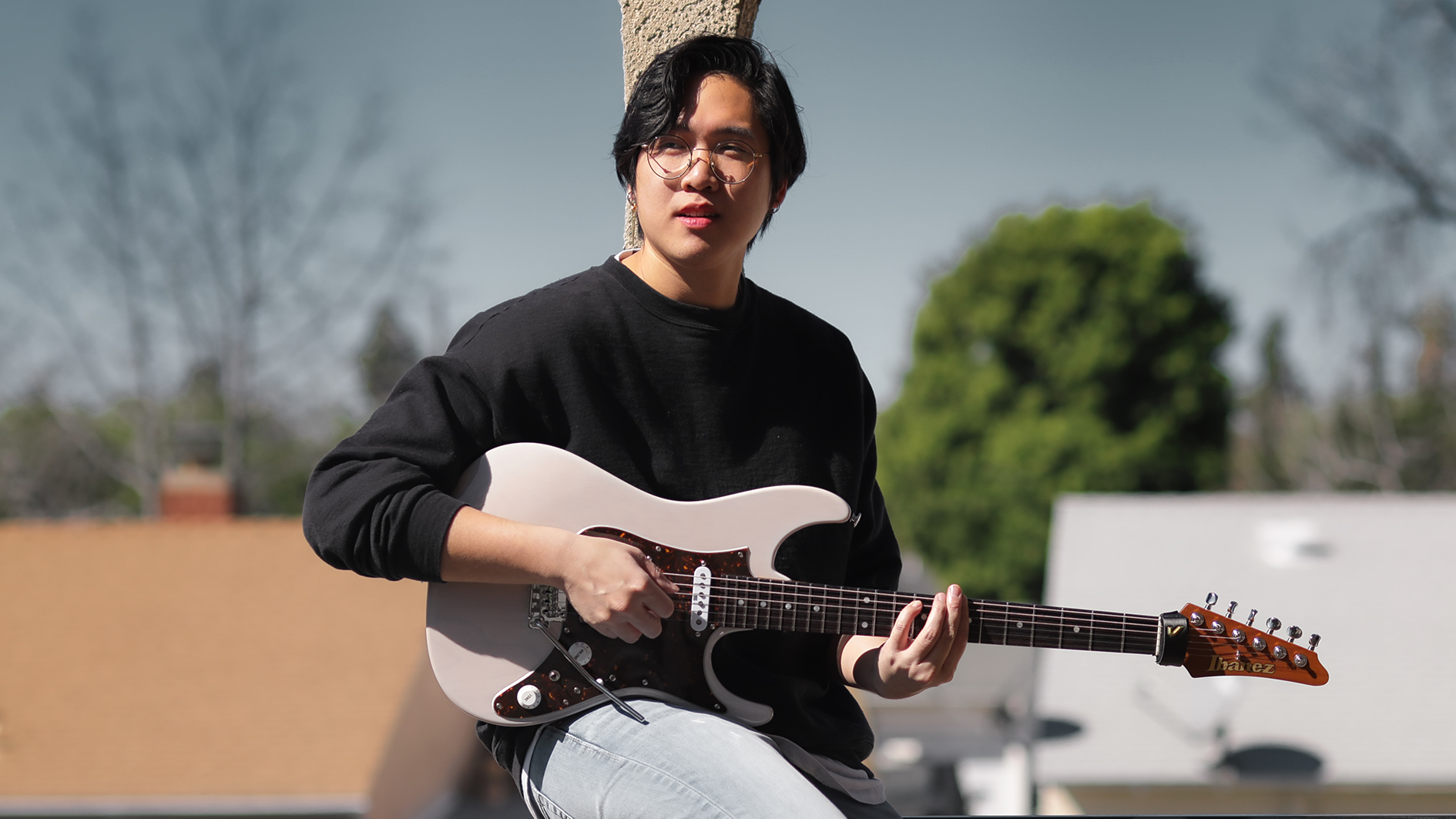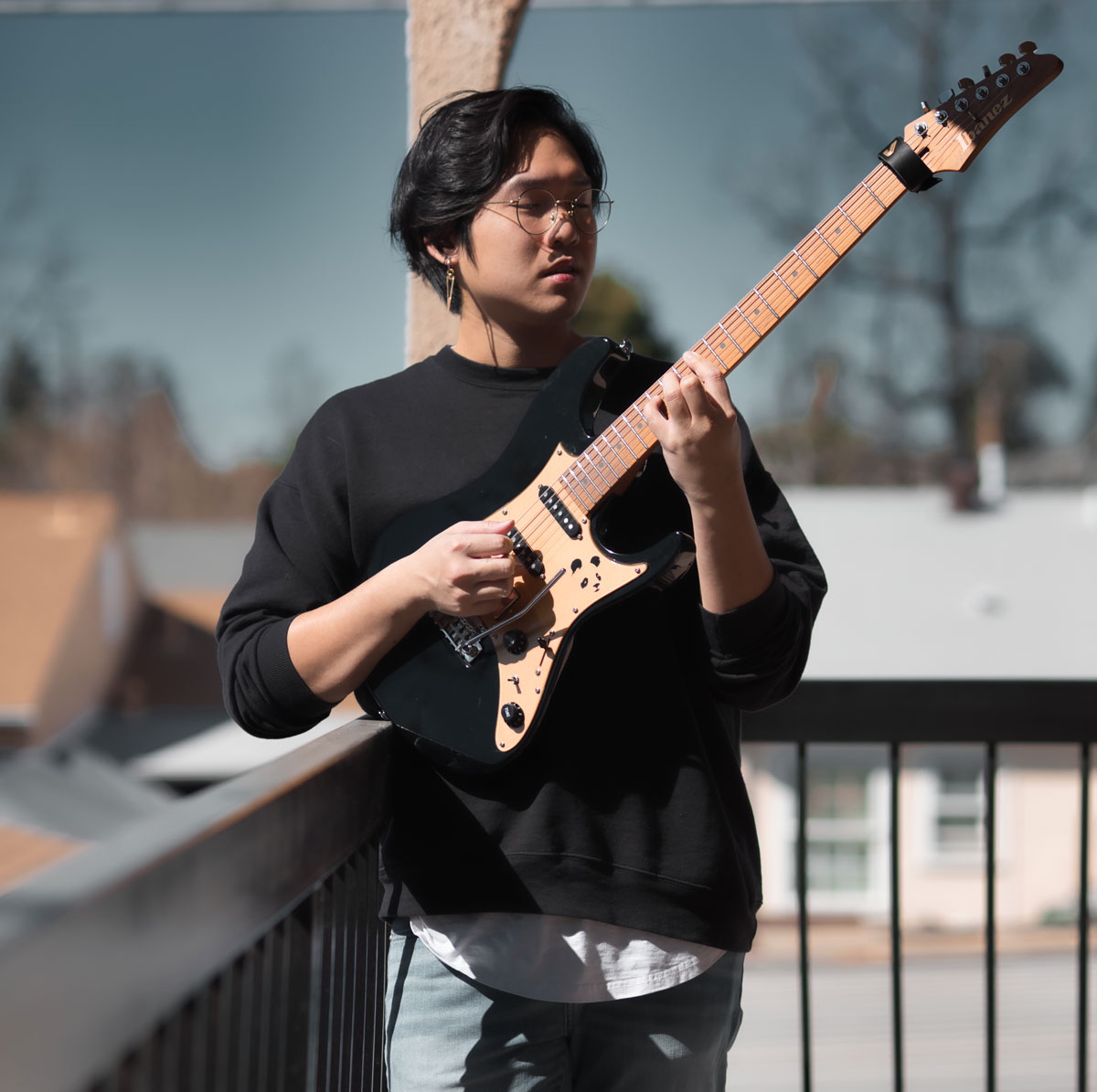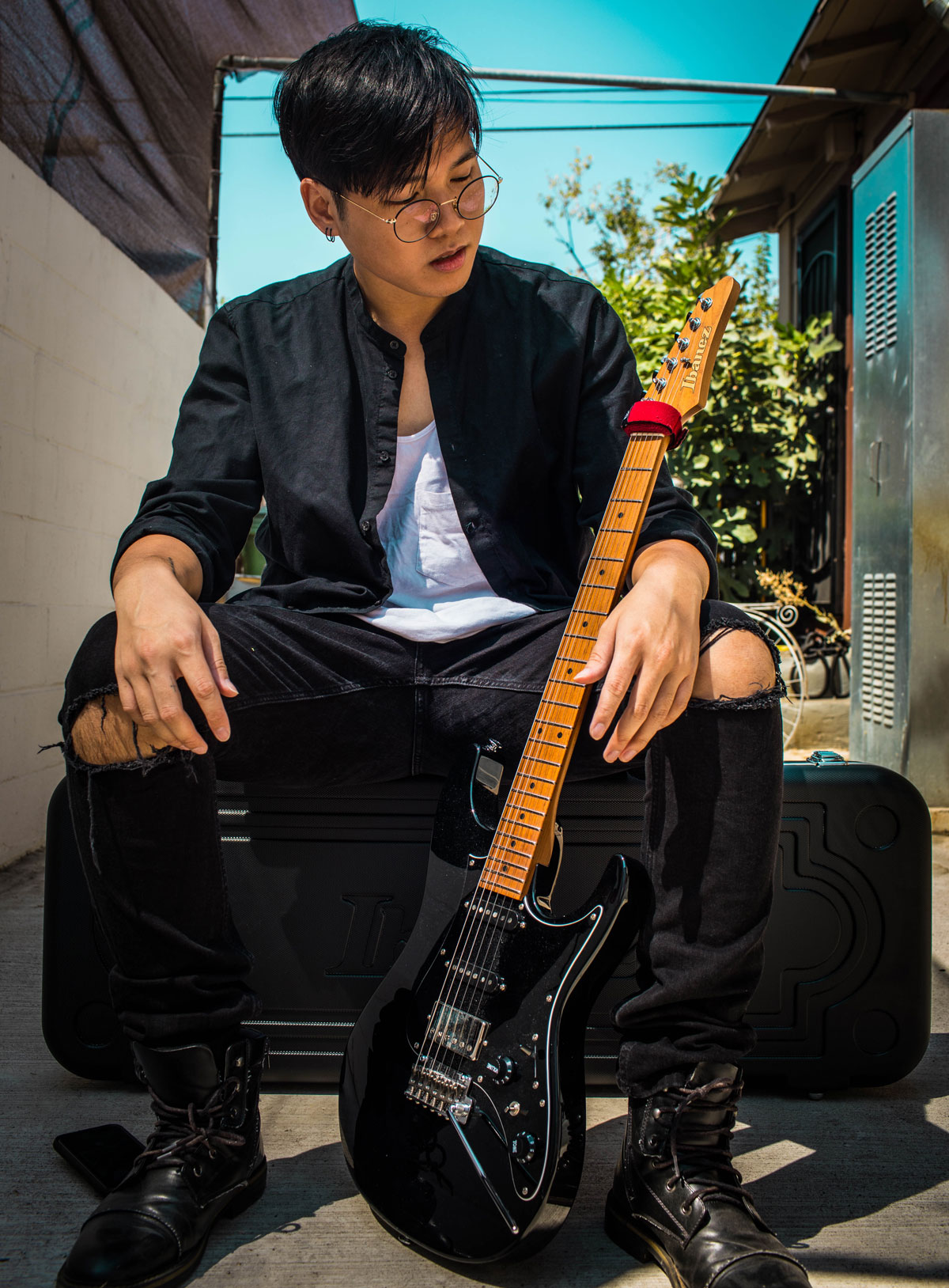Ruben Wan: “I didn’t particularly want to become a guitar player – I was more focused on being a singer-songwriter, but the guitar was a very happy mistake”
Inventive arrangements and whistle-stop technique videos have seen this neo-soul wunderkind attract over 180,000 Instagram followers. Now, Ruben Wan gears up to release his debut EP, Chapter One: Guitar

Ruben Wan’s new EP – Chapter One: Guitar, set for release on March 26 – sees the LA-based musician imagining six tracks with nothing but his six-string. Its first single, Coffee or Tea, pairs some truly mouth-watering chord voicings with clean tones that have no shortage of dazzle and sparkle, fusing elements of jazz and gospel into his own signature sound.
Though he’d worked on music featuring other instruments in the past, this time round he wanted to let his guitar to do all the talking...
“I wanted this EP to be a little more special,” says Wan. “So I decided to use nothing but guitar sounds. I did have songs before that had instrumental beats and other things going on at the same time, so I actually had to stop myself from adding other instruments. It was very challenging but fun at the same time, I was able to explore more of my own sounds using harmonies and guitar textures.”
For the new recordings, the guitarist mainly stuck to his two main Ibanez guitars going through Neural DSP plugins, and feels the tones are among the best he’s ever dialed in. From the reverbs to the drives, it was virtually all what he describes as digital in-the-box stuff…
“Ibanez have this new model called the AZ2204N-PBM and I also have the regular AZ2204B,” he continues. “Almost all the tracks were recorded using those guitars.
“There was just one track called Happy Sad which I used something else, a Fender Offset Special. And even on that track, the main riff was on the Fender but I still used an Ibanez for the harmonies. I thought they complimented each other really nicely...
“And I also have a relationship with Neural DSP, so I dabbled with some of their plug-ins. I used the Archetype: Plini and Archetype: Cory Wong a lot, depending on what the song required. The super clean tones were mainly from the Plini and then I added some of the built-in overdrive within the plug-in.”
Get The Pick Newsletter
All the latest guitar news, interviews, lessons, reviews, deals and more, direct to your inbox!
As it turns out, the only analog pedal or amp involved was a cheap unknown brand chorus he’d found on Amazon...
“For Coffee or Tea, there was a bridge section with a modulation effect and I brought in some analog fuel for that part. And actually I can’t remember the name of it, but it was this random cheap Amazon thing for $40 and it actually sounded really good.”
Which guitar players do you think left the biggest impressions on you?
“I guess my biggest influence in general is Guthrie Govan. He’s my favorite of all-time, there’s nobody that can top him. He plays at a level that one day I hope to achieve… and I think another reason why he’s my most important influence is down to him being my favorite player since the age of 16.
“Though more recently I’ve been listening to a lot of gospel players, from Isaiah Sharkey to the older generation guitarists like George Benson. For my senior recital, one of my solo pieces was a rare George Benson song.
“Usually you hear him in a band setting playing very smooth jazz, but if you scour the Internet you can find this old recording of a song called Tenderly and it’s a solo guitar piece that has everything I loved about solo guitar. And then there also guys like Mateus Asato and Mark Lettieri who are all somehow compartmentalized into my style of playing.”
Do you remember the exact moment you decided you wanted to become a guitar player?
“It was actually when I was at music college! I didn’t even know I was going to be a guitar player until halfway through my bachelor’s degree. I ended up doing music performance and a minor in audio engineering, but I came to Los Angeles to study music…
All the other players were so good, I felt the need to catch up and during that I fell more and more in love with the instrument
“I didn’t particularly want to become a guitar player – I was more focused on being a singer-songwriter, but the guitar was a very happy mistake. All the other players were so good, I felt the need to catch up and during that I fell more and more in love with the instrument.”
One of the tracks you released last year, Expectations, features some really interesting triplets with a muting that brings a very unusual kind of attack...
“That was a very fun track I did with JamTrack Central. I’m going to name two very different influences for that song – the first being trap hip-hop music, which has the fast attack triplet scenario usually on the hi-hat. I love imitating different instruments from different genres, so I took a lot of inspiration from that.
“The other influence is Chinese instrumental music, especially the string stuff! A lot of those Chinese or Japanese instruments, like the Koto guitar, have that specific attack.
“The shamisen, for example, is played with this huge pick and has a lot of those triplet rhythms – which is found in a lot of traditional Chinese and Japanese music. So I found that interesting, they were doing it back then in Asia and now in modern trap music it’s coming back!”
You were born in Panama with Chinese roots, did that also play a part?
“Definitely, though growing up I didn’t really enjoy Chinese music that much. I would rather listen to my salsa or reggaeton than listen to what family were listening to.
“Being born in Panama, all my friends were Latin people and a lot of the music I was exposed to was Latin-centric. But the more I grew up the more I appreciated the music my family would play on Sunday mornings, which was more traditional, old-school floaty Chinese music.”
You also use fast slides, going up a fret and back down quickly, almost like vibrato…
“Yeah, it is like a vibrato thing and I tend to use it for a half step jump specifically for the pentatonic and blues scale notes. I find that it adds a little bit of texture to a note – it’s hard to explain, but I’m so used to doing it I use it all the time now!
“I don’t stay on that note too long, otherwise people might think, ‘What the hell is this?!’ But there are no wrong notes if you know how to resolve them. If you go fast enough, people think it sounds cool.”
It’s fun to create different sounds – going from picking notes to using the whammy can give you such a different vibe
There’s some really interesting Jeff Beck-style whammy work on some of your tracks...
“Jeff is another big influence of mine. I try to combine Guthrie’s precision playing with Jeff’s more open style, especially using the whammy bar. I played a lot of Jeff Beck songs during my college days.
“I try to use the whammy bar for specific notes, so on a song like Expectations it ended up being a big part of the melody. It’s fun to create different sounds – going from picking notes to using the whammy can give you such a different vibe.”
Even though you’re definitely a clean channel kind of player, songs like Fleeting capture that more ambitious side with some Guthrie-style ideas...
“His specific playing style probably isn’t that similar to mine, but if you look hard enough, you might be able to tell that every single thing I do is because I grew up watching him do it. I just incorporate it into a different genre, using things like tapped harmonics or bending from one note to another bend on the next.
“It’s all stuff I’ve learned from Guthrie but presented in a different context. I really like The Aristocrats, too – I actually played their song Bad Asteroid at my senior recital, too.”

Other tracks like Rain and Pure Imagination have a lot of chords around the melody to give it all a context. Did you learn the chord theory while you were at college and if so, how much did it help?
“Those song come out of a lack of bandmates for that specific moment! Sometimes you might come up with a guitar melody with nothing to back you, and it might feel a little empty with the single lead. So I made an effort to accompany myself, holding chords for longer periods of time in order to help compliment the solo guitar aspect of it all.
“I had to learn all my extended chords at music college. Ted Greene is a big influence of mine too, his work helped me understand a lot more about chords. But I think the emphasis is not on the theory or being a nerd about it all. What works really well for the chords in Pure Imagination is the lead voicing only changing one note at a time.
“When you do things like that, people feel more familiar with where it’s going but they can still hear the melody going throughout the song.
“So that was the objective – to only change as little as possible when it came to re-harmonizing the melody and hopefully avoid sounding too jazzy at the same time. Sometimes with all those re-harmonizations people end up feeling it’s too complicated for their ears. I’m all about appealing to the masses!”
There’s a certain energy that only pop music gives in a live setting. A lot of people in the guitar world don’t really identify with it because they want to do their own guitaristic things
As for the leads, there are a lot straightforward pentatonics around moments that feel more jazz-led and outside...
“I’m a big simple pentatonics guy, but when it comes to the outside stuff I’ll mainly use the altered scale or diminished. Those are the ones I always go to – altered being part of the melodic minor family, of course – and then I might even go as far as whole tone scales as well.
“But mainly it’s just chromaticism within pentatonics, I might look at it as pentatonics with a nine or six, but everything’s pentatonics in my world!”
You’ve done a lot of session work in the pop world. What kind of modern artists have shaped your sound or approach?
“I really love The 1975. I saw them live in Chile, which was an interesting combination, and it’s the only time I’ve seen them live. There’s a certain energy that only pop music gives in a live setting. A lot of people in the guitar world don’t really identify with it because they want to do their own guitaristic things.
“But the live energy I experienced at the show shaped my vision for how I want my music to feel. There’s a pop energy that I want to tap into with my songs. There’s also LANY, and other ambient indie artists... that’s what I live for.”

Finally, what do you feel have been your biggest discoveries on your guitar journey so far?
“I’ve learned that transcribing is like steroids in the music world! Honestly, for musicians, training the ear is so important. You can look at tabs and practice scales all you want, but you also need to work on that too.
“Learning by ear is how you internalize things and process information, so everyone should practice that with no music sheet. It’s the truest way of jamming with the greats and you also adopt the musical information into your own playing.
“A lot of musicians wait for inspiration in order to create or improve. I have found that inspiration can be sparse at times, so if you rely on that to create and get better, you might stump your progress.
“Don’t wait for that moment to fuel you with enough emotion to write, make it a habit to keep writing. If you do a little bit every day, that will work out way better than stopping for two weeks and then doing a 10-hour shred session, crashing after pulling an all-nighter. It’s better to stick with consistency.”
- For more information, head to RubenWan.com
Amit has been writing for titles like Total Guitar, MusicRadar and Guitar World for over a decade and counts Richie Kotzen, Guthrie Govan and Jeff Beck among his primary influences as a guitar player. He's worked for magazines like Kerrang!, Metal Hammer, Classic Rock, Prog, Record Collector, Planet Rock, Rhythm and Bass Player, as well as newspapers like Metro and The Independent, interviewing everyone from Ozzy Osbourne and Lemmy to Slash and Jimmy Page, and once even traded solos with a member of Slayer on a track released internationally. As a session guitarist, he's played alongside members of Judas Priest and Uriah Heep in London ensemble Metalworks, as well as handled lead guitars for legends like Glen Matlock (Sex Pistols, The Faces) and Stu Hamm (Steve Vai, Joe Satriani, G3).
“I heard the Money solo and thought, ‘This is amazing!’ So I sent David a telegram saying, ‘Remember me? I'm in a band now called Roxy Music’”: Phil Manzanera on his friendship with David Gilmour, and the key to the Pink Floyd man's unmistakable tone
“It’s really quite genius, but also hard to learn – it sounds insane, but sometimes the easiest songs still get me nervous”: Kiki Wong reveals the Smashing Pumpkins song she had the most trouble with











